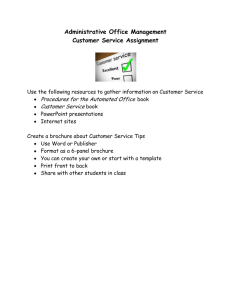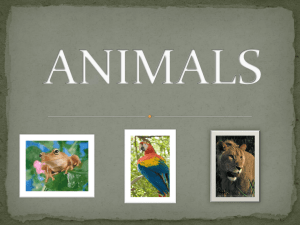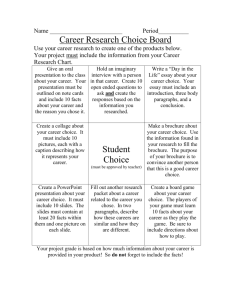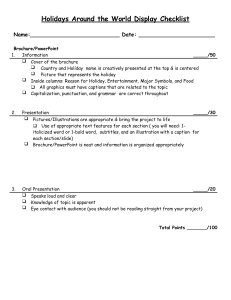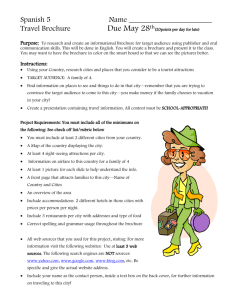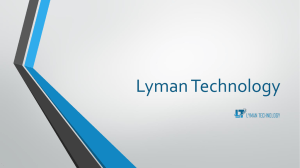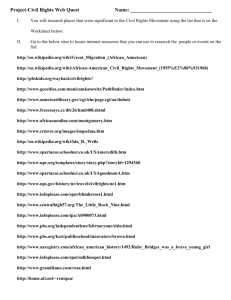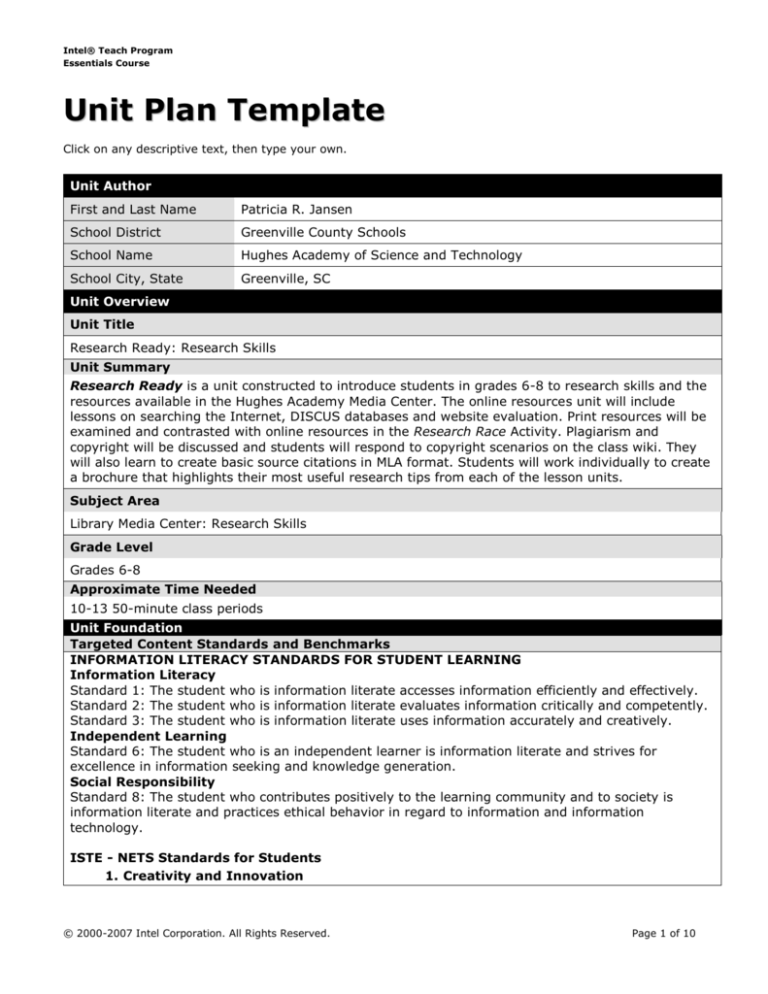
Intel® Teach Program
Essentials Course
Unit Plan Template
Click on any descriptive text, then type your own.
Unit Author
First and Last Name
Patricia R. Jansen
School District
Greenville County Schools
School Name
Hughes Academy of Science and Technology
School City, State
Greenville, SC
Unit Overview
Unit Title
Research Ready: Research Skills
Unit Summary
Research Ready is a unit constructed to introduce students in grades 6-8 to research skills and the
resources available in the Hughes Academy Media Center. The online resources unit will include
lessons on searching the Internet, DISCUS databases and website evaluation. Print resources will be
examined and contrasted with online resources in the Research Race Activity. Plagiarism and
copyright will be discussed and students will respond to copyright scenarios on the class wiki. They
will also learn to create basic source citations in MLA format. Students will work individually to create
a brochure that highlights their most useful research tips from each of the lesson units.
Subject Area
Library Media Center: Research Skills
Grade Level
Grades 6-8
Approximate Time Needed
10-13 50-minute class periods
Unit Foundation
Targeted Content Standards and Benchmarks
INFORMATION LITERACY STANDARDS FOR STUDENT LEARNING
Information Literacy
Standard 1: The student who is information literate accesses information efficiently and effectively.
Standard 2: The student who is information literate evaluates information critically and competently.
Standard 3: The student who is information literate uses information accurately and creatively.
Independent Learning
Standard 6: The student who is an independent learner is information literate and strives for
excellence in information seeking and knowledge generation.
Social Responsibility
Standard 8: The student who contributes positively to the learning community and to society is
information literate and practices ethical behavior in regard to information and information
technology.
ISTE - NETS Standards for Students
1. Creativity and Innovation
© 2000-2007 Intel Corporation. All Rights Reserved.
Page 1 of 10
Intel® Teach Program
Essentials Course
Students demonstrate creative thinking, construct knowledge, and develop innovative
products and processes using technology. Students:
b. create original works as a means of personal or group expression.
2. Communication and Collaboration
Students use digital media and environments to communicate and work collaboratively,
including at a distance, to support individual learning and contribute to the learning of
others. Students:
a. interact, collaborate, and publish with peers, experts, or others employing a
variety of digital environments and media.
b. communicate information and ideas effectively to multiple audiences using a
variety of media and formats.
3. Research and Information Fluency
Students apply digital tools to gather, evaluate, and use information. Students:
b. locate, organize, analyze, evaluate, synthesize, and ethically use information from
a variety of sources and media.
c.
evaluate and select information sources and digital tools based on the
appropriateness to specific tasks.
4. Critical Thinking, Problem Solving, and Decision Making
Students use critical thinking skills to plan and conduct research, manage projects,
solve problems, and make informed decisions using appropriate digital tools and
resources. Students:
b
plan and manage activities to develop a solution or complete a project.
.
c
collect and analyze data to identify solutions and/or make informed decisions.
.
5. Digital Citizenship
Students understand human, cultural, and societal issues related to technology and
practice legal and ethical behavior. Students:
a. advocate and practice safe, legal, and responsible use of information and
technology.
b. exhibit a positive attitude toward using technology that supports collaboration,
learning, and productivity
6. Technology Operations and Concepts
Students demonstrate a sound understanding of technology concepts, systems, and
operations. Students:
a.
understand and use technology systems.
b.
select and use applications effectively and productively.
AASL Standards for the 21st Century Learner
Standard 1: Inquire, think critically, and gain knowledge.
1.1Skills
1.1.4 Find, evaluate, and select appropriate sources to answer questions.
1.1.5 Evaluate information found in selected sources on the basis of accuracy, validity,
appropriateness for needs, importance, and social and cultural context.
1.1.8 Demonstrate mastery of technology tools for accessing information and pursuing inquiry.
1.1.9 Collaborate with others to broaden and deepen understanding.
1.2 Dispositions in Action
© 2000-2007 Intel Corporation. All Rights Reserved.
Page 2 of 10
Intel® Teach Program
Essentials Course
1.2.4 Maintain a critical stance by questioning the validity and accuracy of all information.
1.3 Responsibilities
1.3.1 Respect copyright/ intellectual property rights of creators and producers.
1.3.3 Follow ethical and legal guidelines in gathering and using information.
1.4 Self-Assessment Strategies
1.4.1 Monitor own information-seeking processes for effectiveness and progress, and adapt as
necessary.
Standard 2: Draw conclusions, make informed decisions, apply knowledge to new
situations, and create new knowledge.
2.1 Skills
2.1.4 Use technology and other information tools to analyze and organize information.
2.1.6 Use the writing process, media and visual literacy, and technology skills to create products that
express new understandings.
Standard 3: Share knowledge and participate ethically and productively as members of our
democratic society.
3.1 Skills
3.1.4 Use technology and other information tools to organize and display knowledge and
understanding in ways that others can view, use, and assess.
3.1.6 Use information and technology ethically and responsibly.
Student Objectives/Learning Outcomes
Students will gain basic knowledge of online search strategies and common Boolean
Operators.
Students will familiarize themselves with DISCUS databases.
Students will understand the significance of evaluating online resources.
Students will apply criteria to determine reputable websites.
Students will identify authoritative print resources.
Students will differentiate between Fiction and Non-Fiction genres.
Students will define plagiarism and understand how it applies to Internet “Cut and Paste”.
Students will recognize the importance of plagiarism and copyright, and will use the class wiki
to demonstrate their understanding.
Students will learn to be responsible and cite their research sources.
Students will create a brochure that compiles effective online and print research tips.
Curriculum-Framing Questions
Essential
How can I perform effective research?
Question
Unit EQ # 1: How do I find quality information on the Internet?
Unit
Unit EQ # 2: How do I use print resources?
Questions
Unit EQ # 3: How do I use information ethically?
What are two common Boolean search operators?
What is DISCUS?
What criteria do I use to judge the quality of websites?
What is the Wikipedia and is it a valid resource?
Content
What’s the difference between Fiction and Non-Fiction?
Questions
What are the Dewey call numbers for Non-Fiction resources?
What is plagiarism?
What type of information is copyrighted?
What is MLA?
What are the components for an MLA citation for a book and a website?
Assessment Plan
Assessment Timeline
© 2000-2007 Intel Corporation. All Rights Reserved.
Page 3 of 10
Intel® Teach Program
Essentials Course
Before project work begins
Questioning
Are You
Research
Ready PreAssessment
PowerPoint
Students work on projects
and complete tasks
Ready To
Reflect on
Online
Resources
After project work is
completed
Brochure
Evaluation
Rubric
Am I
Research
Ready? Final
Reflection
Ready To
Reflect on
Print
Resources
Pair and
Share
Research
Ready Unit
Scoring Guide
Plagiarism
and Copyright
Responses on
class wiki
Ready To
Reflect on
Information
Ethics
Ready To
Publish
Checklist with
Peer Review
Assessment Summary
Assessment
Process and Purpose of Assessment
Questioning
Media Specialist uses questioning to determine
level of student research skills.
Are You Research Ready? Pre-Assessment
PowerPoint
Media Specialist uses the Pre-Assessment
PowerPoint to introduce the Are You Research
Ready? Pre-Assessment Activity.
Pair and Share
Students use Pair and Share in the PreAssessment Activity to understand their partner’s
research methods and experience.
Students use the scoring guide to monitor their
progress through the Research Ready Unit. Media
Specialist also uses the guide as a final
assessment at the end of the unit.
Research Ready Unit Scoring Guide
Ready To Reflect on Online Resources
© 2000-2007 Intel Corporation. All Rights Reserved.
Students reflect on what they learned during the
Online Resources Unit. Media Specialist uses
reflection to assess student growth and
understanding.
Page 4 of 10
Intel® Teach Program
Essentials Course
Ready To Reflect on Print Resources
Students reflect on what they learned during the
Print Resources Unit. Media Specialist uses
reflection to assess student growth and
understanding.
Plagiarism and Copyright Responses on class wiki
Students use the wiki to share new knowledge
and ideas with others. Media Specialist uses
responses to monitor students’ critical thinking
skills and comprehension of the Information
Ethics unit.
Ready To Reflect on Information Ethics
Students reflect on what they learned during the
Information Ethics Unit. Media Specialist uses
reflection to assess student growth and
understanding.
Ready To Publish Checklist with Peer Review
Students use checklist to receive peer feedback
and ensure that all required brochure components
are present. Media Specialist uses checklist in
final assessment of binder.
Brochure Evaluation Rubric
Students use the rubric to self-assess their
Research Brochure. Media Specialist uses the
rubric to grade the Research Brochure and to
assess the student’s understanding of research
concepts and application of their new knowledge.
Am I Research Ready? Final Reflection
Students reflect on what they learned during the
Research Ready unit. Media Specialist uses
reflection to assess student growth and
understanding.
Unit Details
Prerequisite Skills
Students should have a basic understanding of Internet usage, and a basic knowledge of Microsoft
Word and Microsoft Publisher.
Instructional Procedures
Introduction (1 class period)
Introduce the unit by asking students what types of research projects they have worked on and how
they approach the research process. Explain that research gets more complex as students progress
in school. Introduce the Essential Question, How can I perform effective research?
Explain that students will now take part in the Are You Research Ready? Activity. Present the Are You
Research Ready? PowerPoint, explain the activity and distribute the Are You Research Ready?
Worksheet. Pair the students with a partner, direct them to begin the Are You Research Ready?
Activity, and encourage them to discuss research methods with their partner. Discuss students’
findings in whole group discussion.
Provide students with an overview of the main three topics in the Research Ready unit. Explain about
the culminating project, the Research Ready Student Brochure, and show the Student Sample
Brochure and Brochure Evaluation Rubric. Distribute the Research Ready Brochure Worksheet and
the Research Ready Unit Scoring Guide, and explain how the worksheet will organize their project
information and the scoring guide will manage their participation throughout the unit.
Unit Lesson 1 – Online Resources (3-4 class periods)
Begin Lesson One (Online Resources) with the introduction of the Unit Question, How do I find
quality information on the Internet? Discuss student replies and provide an overview of the Online
© 2000-2007 Intel Corporation. All Rights Reserved.
Page 5 of 10
Intel® Teach Program
Essentials Course
Resources Unit. Present the Online Search Strategies PowerPoint, discuss and clarify student
questions. Explain the online search activity and distribute the Ready To Search? Worksheet. Discuss
students’ findings in whole group discussion. Direct students to complete the Online Searching
section of the Research Ready Brochure Worksheet.
Ask students for alternative ways to search online. Introduce the DISCUS databases, show the
website, and discuss access and passwords. Demonstrate navigation on the DISCUS website and
identify databases which are popular for middle school projects. Explain how to search within the
DISCUS databases, and elaborate on the unique searches for Biography Resource Center and the
newspaper databases. Direct students to explore the DISCUS databases, perform sample searches
and complete the DISCUS question on their Research Ready Brochure Worksheet.
Lead in to Lesson Two (Online Resources) by discussing how quality and reliability of online
information should be questioned. Tell students they must learn to evaluate websites to pick the best
resources. Present the Website Evaluation PowerPoint, emphasize the evaluation criteria, discuss and
clarify student questions. Direct the students to the Research Ready Evaluating Web Sites Webquest,
explain the tasks, distribute the Ready To Review Web Sites Organizer, and direct students to
complete webquest Lesson1. Discuss students’ observations about the spoof websites in whole group
discussion.
Assign students to work in pairs, distribute the Ready To Evaluate Web Sites Chart, and direct
students to complete webquest Lesson 2. Instruct the class to compare their website rankings and
critically evaluate each website as a valid source of information. Remind students to finish the
Evaluating Websites section of the Research Ready Brochure Worksheet, and sign off when they
complete the Online Resources Section. Ask students how they would now respond to the Unit
Question, How do I find quality information on the Internet?, and discuss their responses in whole
group discussion. Direct students to assess their learning by completing the Ready To Reflect On
Online Resources Form.
Unit Lesson 2 – Print Resources (2 class periods)
Begin Lesson Two (Print Resources) by asking students where they first look to find information for a
project, in a book or on a computer? Discuss students’ responses in whole group discussion and pose
the Unit Question, How do I use print resources? Provide an overview of the Print Resources Unit.
Demonstrate the OPAC Online Catalog and ask if students are familiar with its use. Emphasize the
difference between Fiction and Non-Fiction, explain the Dewey Call Numbers, and show examples
from the OPAC catalog. Walk around the Media Center to show students where the different Call
Numbers and genres are located, and point out the corresponding library signage. Show the different
print resources to students while explaining their use: Encyclopedias, Reference sources, Biographies
and Non-Fiction titles. Elaborate on encyclopedia articles, and how information is organized into
indexes and volumes. Answer questions and explain that students will locate and examine print
references using the Ready To Find Print Resources Worksheet. Discuss students’ results in whole
group discussion, and promise them a special guest and fun activity for tomorrow’s lesson.
Introduce Jessica Babb, Teen Librarian for the Greenville County Library, and explain that she will
conduct the Research Race Activity. Ms. Babb challenges students on whether they can find
information quicker in print or online resources. Enlist class predictions about which type of resource
is quicker. Ms. Babb explains about the Research Race Activity and presents excerpts from the
Research Race Science Station PowerPoint. Separate students into teams, assign them to one of the
four research stations (Almanacs, Books, Encyclopedias, Computers), provide four sets of research
questions (RR Questions1, RR Questions2, RR Questions3, RR Questions4), and direct them to rotate
through the four stations (RR Table). Facilitate the Research Race Activity and record the teams’
scores (RR Scoring Example). Compare results and declare the winning resource. Ask students if they
© 2000-2007 Intel Corporation. All Rights Reserved.
Page 6 of 10
Intel® Teach Program
Essentials Course
predicted the winner and how they would now respond to the Unit Question, How do I use print
resources? Discuss their responses in whole group discussion, and direct students to assess their
learning by completing the Ready To Reflect On Print Resources Form. Remind students to finish the
Print Resources section of the Research Ready Brochure Worksheet, and sign off as they complete it.
Unit Lesson 3 – Information Ethics (2-3 class periods)
Begin Lesson Three (Information Ethics) with the introduction of the Unit Question, How do I use
information ethically? Discuss student responses and provide an overview of the Information Ethics
Unit. Read excerpts of “When Marion Copied” to the students and discuss how the character
plagiarized. Present the Plagiarism/Copyright PowerPoint and discuss plagiarism, copyright and
source citation. Open the Media Center wiki and show students how to edit a wiki page, adding a few
students’ comments about plagiarism and copyright. Demonstrate wiki navigation and show the
Information Ethics Activity on the Copyright & Plagiarism page of the wiki. Explain that students will
research plagiarism, explore contemporary copyright cases, and post their findings to the Copyright
& Plagiarism page of the wiki. Click on resource links and demonstrate posting to the wiki. Remind
students to answer the plagiarism and copyright questions on the Research Ready Brochure
Worksheet.
Discuss source citations, explain MLA source citation formats and review MLA citation examples in the
Plagiarism/Copyright PowerPoint. Distribute the Ready To Cite Worksheet and direct students to
choose a website from the Resources page of the class wiki and Non-Fiction book from the Media
Center, complete the worksheet and create two MLA source citations. Remind students to complete
the MLA questions and Information Ethics section of the Research Ready Brochure Worksheet, and
sign off as they complete it. Revisit the Unit Question, How do I use information ethically? Discuss
their responses and direct students to assess their learning by completing the Ready To Reflect On
Information Ethics.
Unit Lesson 4 – I’m Research Ready! (2-3 class periods)
Review key concepts of online searching, website evaluation, print resources and information ethics
and revisit the Essential Question, How can I perform effective research? Discuss responses in whole
group discussion and introduce the culminating project, the Research Ready Student Brochure.
Review the Student Sample Brochure and Brochure Evaluation Rubric, and remind students that their
Research Ready Brochure Worksheet contains all the information for their brochure. Demonstrate
Microsoft Publisher and open a new document using the Brochure Template. Remind students that
their Research Ready Brochure Worksheet must be complete and signed off before they can create
their brochure. Tell students to have a classmate review their completed brochure to make
suggestions, check for completeness and sign off on the Ready To Publish Checklist. Allow students
an extra day to revise brochures and integrate peer feedback. Direct students to assess their
learning by completing the Final Research Ready Reflection Form.
Accommodations for Differentiated Instruction
The resource student will be given additional time to complete all unit worksheets
and activities. Additional time will also be given for the student research brochure
project, and required brochure components may be simplified or reduced.
Resource
Student
Resource students may work with student partner or Special Education personnel,
and may use the OSLIS Citation Generator to format MLA citations. Media Center
computers will provide assistive technologies for students needing lager text size,
voice recognition, wheelchair accessibility and other accommodations .
© 2000-2007 Intel Corporation. All Rights Reserved.
Page 7 of 10
Intel® Teach Program
Essentials Course
Nonnative
English
Speaker
Gifted
Student
The nonnative English speaking student will be given additional time to complete all
unit worksheets and activities. Additional time will also be given for the student
research brochure project, and required brochure components may be simplified or
reduced.
The nonnative English speaking student may work with a more proficient bilingual
student partner or the ESOL instructor. The nonnative English speaker may use
translation software, bilingual dictionaries, glossary lists, and the OSLIS Citation
Generator to format MLA citations. The nonnative English speaking student may also
complete their assignments in their first language and then translate into English.
The gifted student may create their own student brochure template, or undertake
the independent study of a plagiarism or copyright issue and include their findings in
their student brochure. The gifted student may offer more in-depth information in
their assignments or explore resources from a higher grade-level. Gifted students
may also help other students or assist the Media Specialist.
Materials and Resources Required For Unit
Technology – Hardware (Click boxes of all equipment needed)
Camera
Laser Disk
VCR
Computer(s)
Printer
Video Camera
Digital Camera
Projection System
Video Conferencing Equip.
DVD Player
Scanner
Other
Internet Connection
Television
Technology – Software (Click boxes of all software needed.)
Database/Spreadsheet
Image Processing
Web Page Development
Desktop Publishing
Internet Web Browser
Word Processing
E-mail Software
Multimedia
Other
Encyclopedia on CD-ROM
American Association of School Librarians. Information Power: Building
Partnerships for Learning. Chicago: American Library Association, 1998.
Printed Materials
Berg, Brook. When Marion Copied: Learning About Plagiarism. Fort Atkinson,
Wisconsin: Upstart Books, 2006.
Supplies
Printer paper.
© 2000-2007 Intel Corporation. All Rights Reserved.
Page 8 of 10
Intel® Teach Program
Essentials Course
Beck, Susan. “The Good, The Bad & The Ugly: or, Why It’s a Good Idea To
Evaluate Web Sources: Evaluation Criteria.” 1997. Accessed 10/15/2005.
<http://lib.nmsu.edu/instruction/evalcrit.html>.
“Copyright Website.” 2008. Accessed 07/10/2008.
<http://www.benedict.com/>.
“Copyright with CyberBee.” 2004. Accessed 07/10/2008.
< http://www.cyberbee.com/copyrt.html>.
“DISCUS: Your Information Place.” 2008. Accessed 06/13/2008.
<http://www.scdiscus.org/>.
“NETS for Students.” ISTE. 2008. International Society for Technology in
Education. Accessed 06/11/2008.
<http://www.iste.org/AM/Template.cfm?Section=NETS>.
“Plagiarism.org: Learning Center.” 2008. Accessed 07/10/2008.
<http://www.plagiarism.org/>.
Internet Resources
Schrock, Kathleen. “Successful Web Search Strategies.” 2002. Accessed
07/07/2008. <http://kathyschrock.net/slideshows/searching.pdf>.
Schrock, Kathleen. “Teacher Helpers: Critical Evaluation Information.” 2008.
Accessed 06/20/2008.
<http://school.discoveryeducation.com/schrockguide/eval.html>.
Silgals, Mary. “Evaluating Websites.” 2004. Accessed 06/19/2008.
<http://marysilgals.tripod.com/evaluatingwebsites.html>.
“Standards for the 21st Century Learner.” AASL. 2008. American Association
of School Librarians. Accessed 06/13/2008.
<http://www.ala.org/ala/aasl/aaslproftools/learningstandards/standards.cfm
>.
Valenza, Joyce. “Power Searching 501 (?): a crash course.” 2003. Accessed
07/06/2008. <http://www.sdst.org/shs/library/powerpoint/searchskills.ppt>.
Valenza, Joyce. “A Webquest About Evaluating Webquests” 2001. Accessed
06/20/2008. <http://www.sdst.org/shs/library/evalwebstu.html>.
Other Resources
Coordinate with Jessica Babb, Teen Librarian for the Greenville County
Library, and schedule a date for her to come to the Hughes Academy Media
Center to conduct the Research Race Activity. Line-up volunteers to man the
four research stations, provide computers with Internet access, pull print
resources, and coordinate with Ms. Babb if no print resources are found for
any of the research questions.
© 2000-2007 Intel Corporation. All Rights Reserved.
Page 9 of 10
Intel® Teach Program
Essentials Course
Programs of the Intel® Education Initiative are funded by the Intel Foundation and Intel Corporation.
Copyright © 2007, Intel Corporation. All rights reserved. Intel, the Intel logo, Intel Education Initiative, and Intel Teach Program are
trademarks of Intel Corporation in the U.S. and other countries. *Other names and brands may be claimed as the property of others.
© 2000-2007 Intel Corporation. All Rights Reserved.
Page 10 of 10

